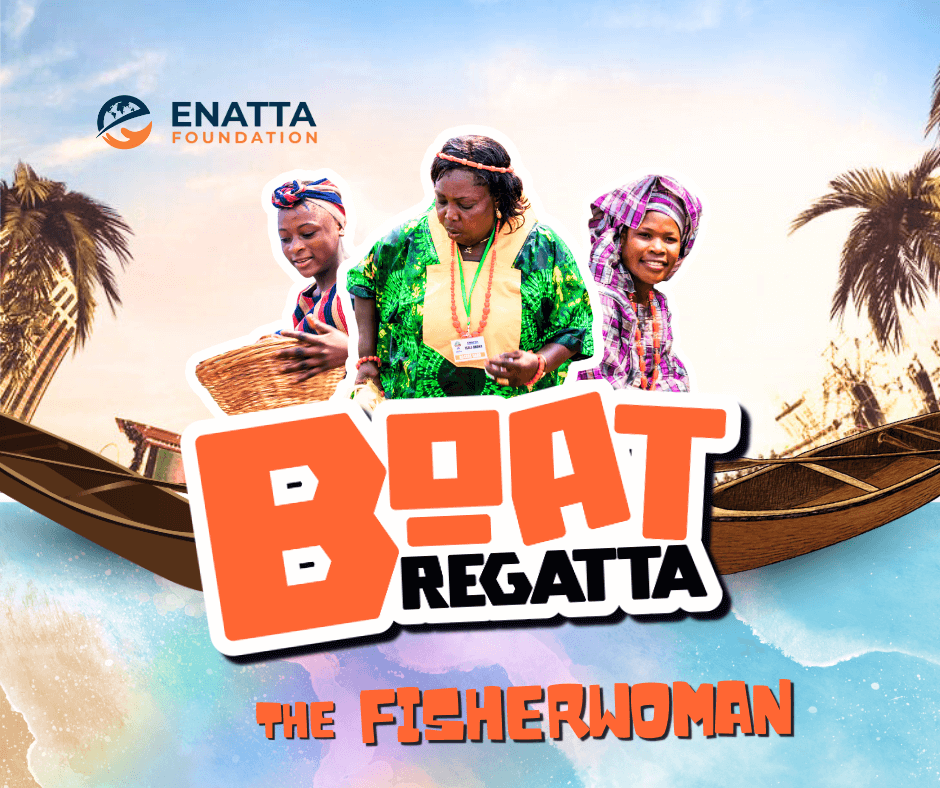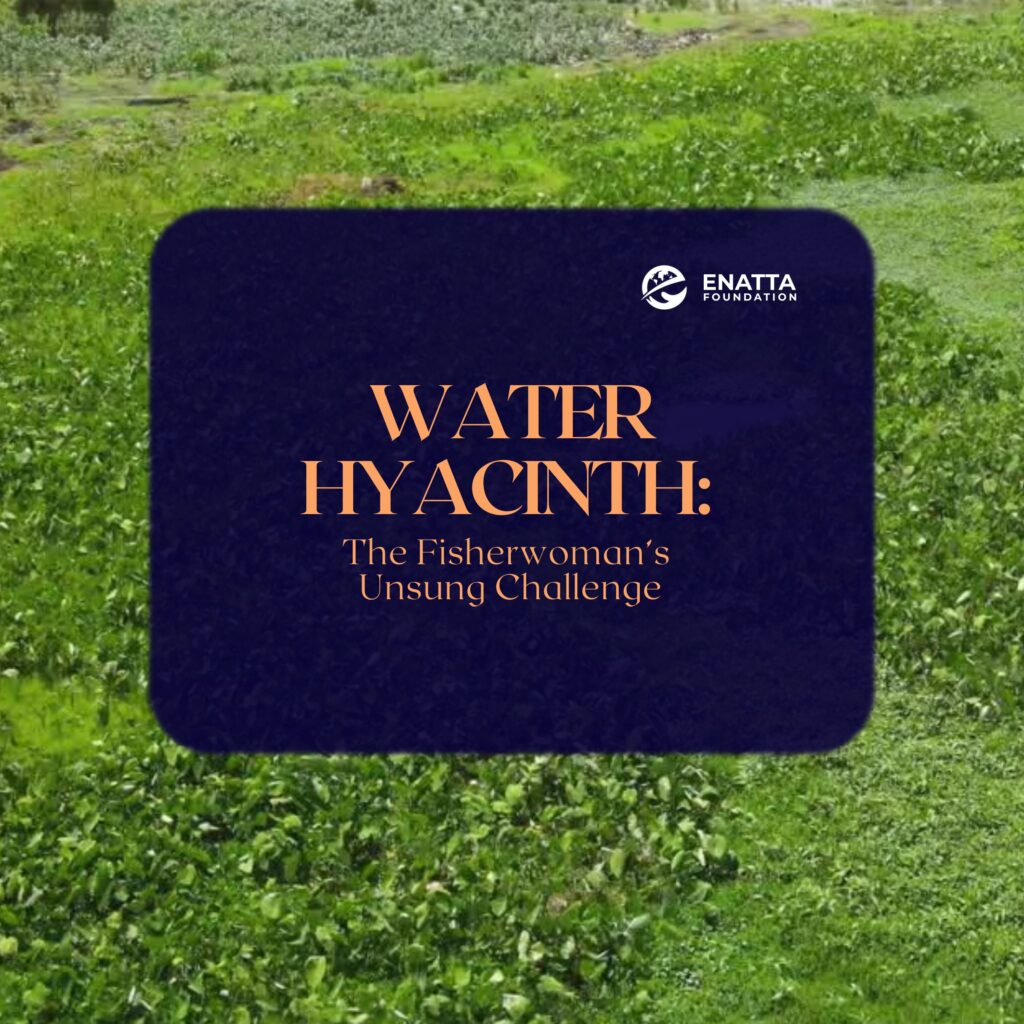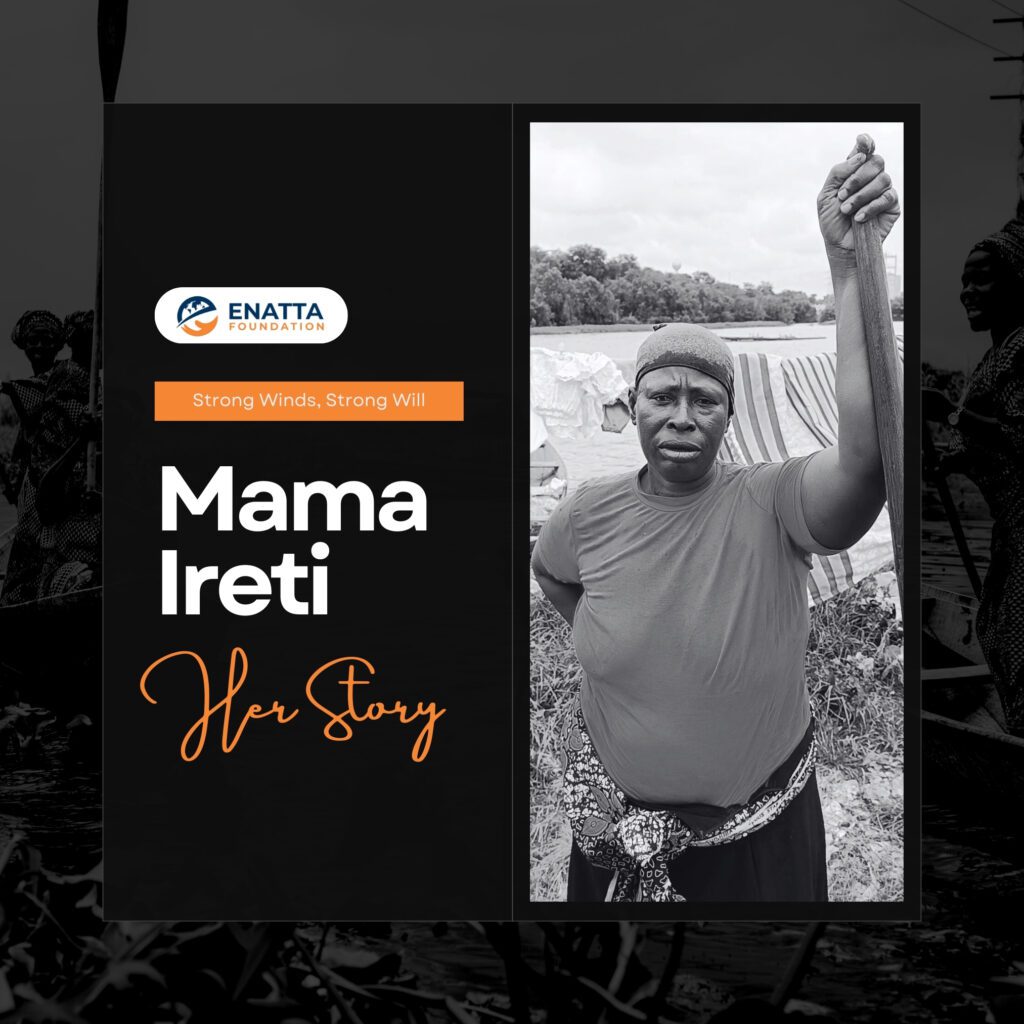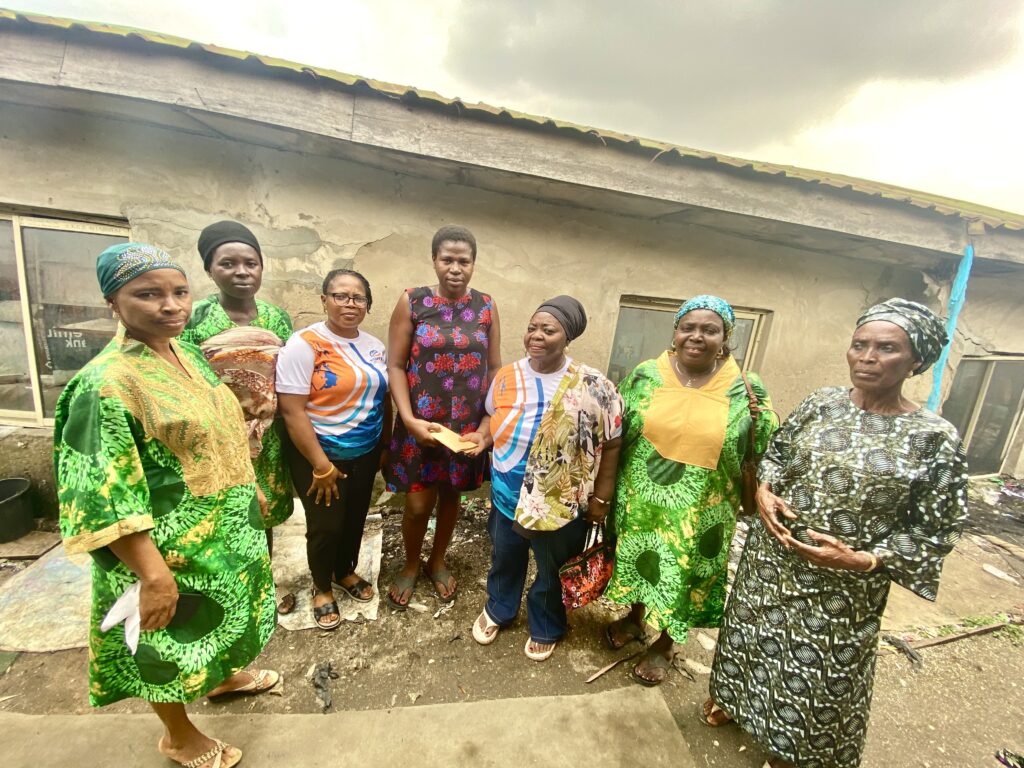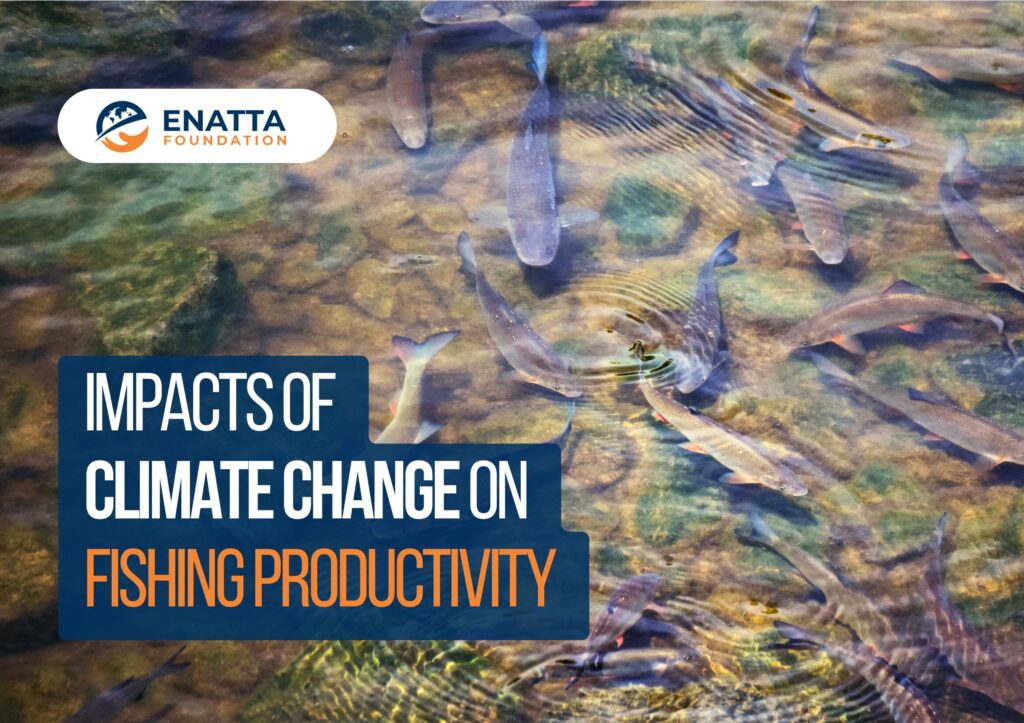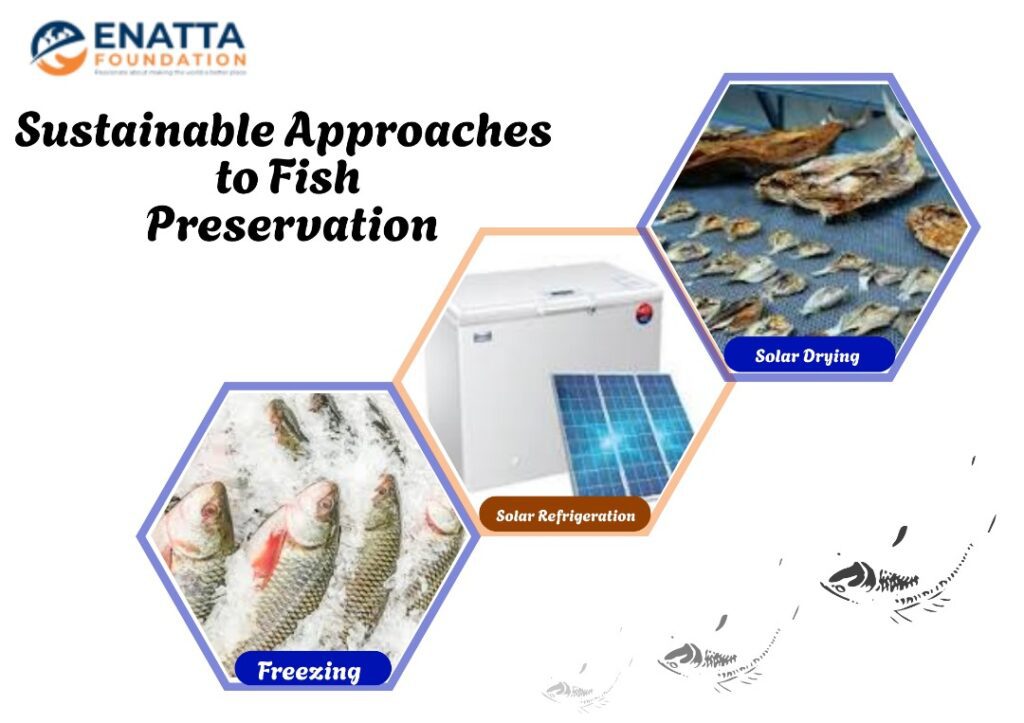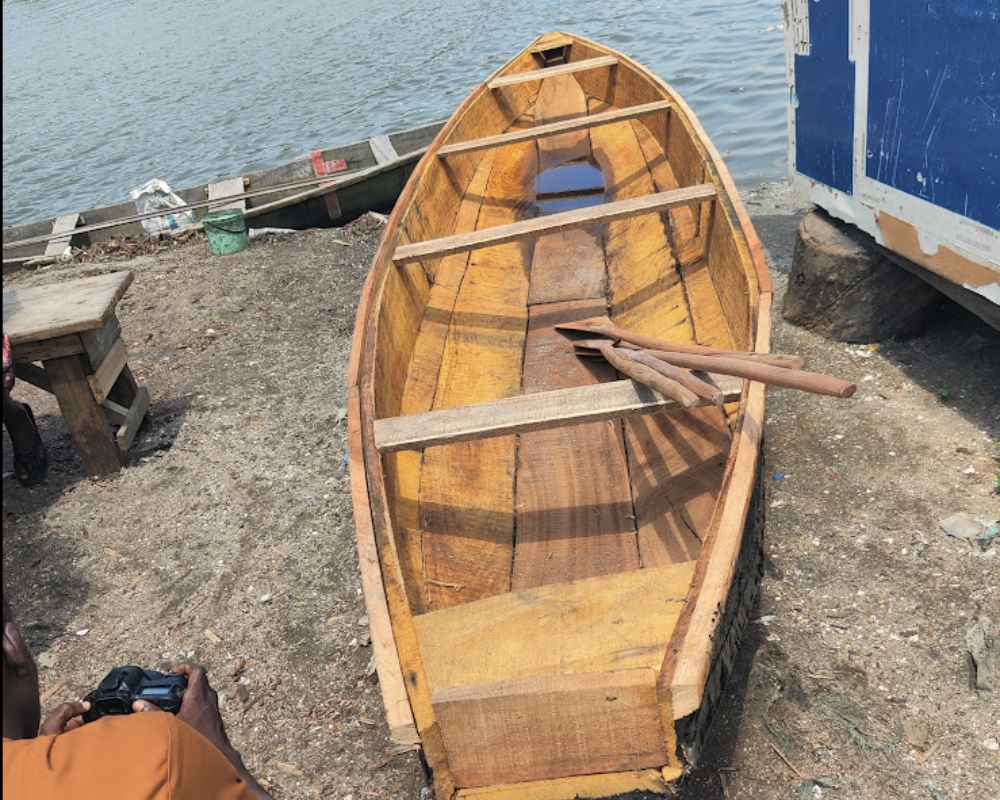Category Blog
28 Nov
Enatta Foundation Boat Regatta: Of Culture and Identity
A warm and engaging look at the Enatta Foundation Boat Regatta, capturing how the event drives the culture and identity of the fisherwomen who bring it to life, and the community impact that grows with each edition.
READ MORE23 Oct
Water hyacinth: The Fisherwoman’s Unsung Challenge
Across Nigeria’s lagoons, fisherwomen like Iya Pupa and Rashidatu struggle with the invasive water hyacinth, a plant that threatens livelihoods but also holds hidden potential for sustainable innovation.
READ MORE12 Sep
“I Have Been Fishing for Over Twenty Years, and I Am Grateful to Enatta” – Meet Mama Ireti: A Fisherwoman Defying the Odds of Nature and Poverty
This is the story of Mama Ireti, a fisherwoman who has defied the tides of the Lagos lagoon for over twenty years. Her dedication to survival is admirable and worth sharing.
READ MORE1 Sep
Standing with Our Fisherwomen: A Condolence Visit to Isale-Akoka
On September 28th, Enatta Foundation visited the Isale-Akoka community to stand with the family of a fisherwoman who had recently passed away. Beyond offering a token of financial support, the visit was a moment of compassion and solidarity, reflecting the foundation’s deep commitment to the women whose strength sustains coastal communities. It was a reminder that Enatta Foundation’s work is not only about projects and programmes but also about showing up for fisherwomen and their families in times of need.
READ MORE11 Aug
Impacts of Climate Change on Fishing Productivity
Artisanal fishery contributes largely to Nigeria's economy but it faces a major challenge: climate change. Here are the impacts of this change on fishing productivity.
READ MORE1 Aug
Sustainable Approaches to Fish Preservation
Sustainable Approaches to Fish Preservation Fish is important to daily nutrition and for many years, it has been a source of income for countless communities especially those in riverine areas. However, it faces a major challenge that leads to substantial post-harvest losses: rapid spoilage. Fish spoilage is a natural process, and primarily, it is driven by two factors: bacterial action and autolytic enzymes. The ever-present bacteria on the fish’s surfaces and guts begin their work once the fish is caught by breaking down the fish’s tissues thereby causing undesirable smells and textures. While rigor mortis (the stiffening of the muscles after death) offers a brief reprieve due to lactic acid, it is often a fleeting defense as the bacterial actions eventually continue. Also, autolytic enzymes in the fish contribute to softening the flesh and spoilage, especially under unfavorable conditions like high temperatures or delays in processing. This underscores the critical need for effective preservation methods immediately after harvest. Fish preservation has to do with reducing fish spoilage and increasing the shelf life of fish through varying methods so that it is durable and healthy for human consumption. It is important to note that maintaining fish freshness is not only to encourage food safety, but to sustain the stability of local economies and the well being of communities. Thus, it is no news that the Enatta Foundation is making commendable efforts in this regard, particularly in empowering Nigerian fisherwomen through facilitating innovative post-harvest storage initiatives. Modern Solutions for Fish Preservation Traditional methods of fish preservation like sun drying, salting, smoking, canning and pickling have long served communities; however, modern challenges demand modern solutions. Empowering fisherwomen with the right tools is paramount to reducing post-harvest losses and enhancing their economic resilience. Knowing this, a cornerstone of Enatta Foundation’s post-fish harvest storage initiatives is the promotion and provision of effective cold chain solutions such as refrigeration. Freezing Freezing is one of the most effective methods for sustaining the flavour and quality of fresh fish, closely mimicking its just-caught state. This is because freezing significantly inhibits the metabolic activities that lead to spoilage. There is an emphasis on the careful handling of fish immediately after capture, followed by prompt gutting and cleaning. The use of airtight wrapping materials to prevent freezer burn and the maintenance of consistent freezer temperatures at 0 degrees Fahrenheit (-18 degrees Celsius) or lower effectively reduces the growth of spoilage microorganisms. The Foundation supports both traditional ice-packing methods and the use of deep freezers, understanding that flexibility is key to adoption. It carried out a profound intervention during the International Women’s Day (IWD) 2025 celebration by distributing refrigerators and high quality polystyrene boxes to women in fishing communities. This initiative directly addressed the problem of limited storage and enabled fisherwomen to preserve their catch more effectively and secure better market prices for their produce. Enatta Foundation officials and fisherwomen with refrigerators and polystyrene boxes Solar-Powered Fish Preservation Methods Beyond the distribution of refrigerators, Enatta Foundation advocates for the incorporation of solar-powered fish preservation methods. Solar power is rising as a transformative solution for remote and off-grid fishing communities like many communities in Nigeria. This approach utilizes the abundant energy of the sun to reduce post-harvest losses and empower local economies. They include: Solar Refrigeration There is a push for the incorporation and widespread application of solar power in fish preservation via refrigeration. Solar-powered refrigerators and cold rooms are a pivotal link in the cold chain system, as they enable fish preservation especially in areas without reliable electricity. These systems make use of photovoltaic panels to generate electricity, which then powers refrigeration units. This allows for the chilling or freezing of fish, thereby significantly extending its freshness and market value. Solar Dryers Solar fish dryers are a remarkable advancement over traditional open-air sun drying. These enclosed structures, which often resemble greenhouses or tents, improve the drying process by controlling temperature and protecting the fish from pests and contamination. They fasten moisture removal and create a more hygienic and higher-quality dried product. Some advanced solar dryers incorporate ventilators to maintain optimal drying conditions. This further improves efficiency and reduces drying times from days to hours. This technology is a sustainable alternative to the use of traditional smoking kilns which are often harmful to the health of its users due to high emissions. It is also extremely impactful in fishing communities where traditional sun-drying is hindered by unpredictable weather or unsanitary conditions. A Sustainable Future for Fisherwomen These post-fish harvest storage initiatives are about ensuring food security and fostering economic independence within fishing communities. By providing essential tools like refrigerators and polystyrene boxes, and seeking partnerships for a move towards solar-powered fish preservation systems, Enatta Foundation is empowering fisherwomen to transform their livelihoods and creating a more sustainable and prosperous future for them.
READ MORE22 Jul
Women Who Fish: How Enatta Foundation is Raising Empowered Fisherwomen
Women Who Fish: How Enatta Foundation is Raising Empowered Fisherwomen Women do fish. No, it is not just fishing in small waterbodies using scooping nets. I mean fishing that involves the use of boats and large nets. Lagos State, amongst Nigeria’s other coastal communities, has a sizable number of fisherwomen who contribute to the food system and Nigeria’s local economy. Despite the estimated 47% of women involved in capture fisheries in Nigeria, the Nigerian fisheries sector has been proven by studies to be gender biased regarding prominence in participation. The male fisherfolks often dominate the scene and occupy important positions which include control and access to productive resources of fishing systems. They are in possession of the fishing vessels and equipment used in the capture fisheries sector. In essence, they rule that world. Many times, these roles confer on them pecuniary benefits such as investment opportunities, loan facilities, importing and exporting licences, among others. Regardless of women’s economic potential in small-scale fisheries, investments by women in the artisanal, aquaculture and industrial fishing sectors are at terribly low levels. Fisherwomen most times play the second-fiddle role of processing and marketing while depending on fishermen for major decisions. This reveals the underlying socio-cultural norms and gender relations replete in the fishing sector. Furthermore, these create intersectionality which is a factor that most often impedes the women’s opportunities to own, access to or control productive resources and other inputs. Gender mainstreaming in the fisheries sector is unfortunately still a major problem in Nigeria and thankfully, Enatta Foundation is one out of many organisations that is redirecting the tide of the narrative. Enatta Foundation’s Role in Raising Empowered Fisherwomen Foundation is a nonprofit organization committed to empowering underserved fisherwomen in Nigeria’s coastal communities through sustainable livelihoods, financial and environmental initiatives. Having witnessed the hardship that comes with not only being a woman, but being a fisherwoman in Nigeria; the lack of access to the tools and opportunities freely given to the male fisherfolk, and the inability to stand as independent entities, social entrepreneur, Mrs Adijat Okuyelu founded the organisation to empower fisherwomen, in partnership with private and government establishments. Over the years, Enatta Foundation has recorded a profound impact on the lives of these fisherwomen through several initiatives and projects, some of which include: The Boat Project The Boat Project is a cornerstone initiative by Enatta Foundation aimed at directly enhancing the fishing capacity and economic sustainability of fisherwomen. Through this project, the Foundation has provided durable, locally built boats and essential fishing gear to fisherwomen in Lagos’ fishing communities such as: Isale-Akoka, Ilaje-Ebute, Ago-Egun, Oworonshoki, Ogudu, Araromi, Agboyi and Ajegunle. The impact of this initiative is significant, has kick-started economic activities and has been shown to increase the income of these women by 60-100%. Prawn Catchers Initiative This is another transformative initiative designed to empower fisherwomen by providing them with prawn catchers in order to maximize their participation in the prawn catching season. This initiative has created a ripple effect that has benefited entire families and communities leading to enhanced food security and greater opportunities for future generations. Money Mata Programme Enatta Foundation has contributed in raising empowered fisherwomen through its Money Mata programme. This focuses on financial literacy and business empowerment for riverine women. It also addresses the lack of fundamental financial education, tools and networks that often hinder fisherwomen from scaling their operations and building lasting wealth. The programme equips women with practical, hands-on knowledge in personal finance management, record keep and very importantly, participation in established cooperative groups. Water Hyacinth Removal Initiative Addressing environmental constraints is a key aspect of the Enatta Foundation’s work. Through this initiative, the Foundation investigates problem areas along Lagos’ waterways and partners with organisations to collect and recycle water hyacinths which are invasive aquatic plants that hinder environmental sustainability and economic stability for the women. Post-Harvest Storage Initiative The foundation has also distributed refrigeration units to fisherwomen as part of its post-harvest initiative. The project provides refrigeration units and polystyrene boxes to fishing communities, in order to reduce food spoilage, as well as to mitigate post-harvest fish loss. This initiative is transforming livelihoods by reducing spoilage and increasing economic stability for underserved fishing communities. The Boat Regatta The Enatta Foundation celebrates the resilience and cultural heritage of coastal women through a structured and inclusive Boat Regatta that fosters social recognition, cultural exposure and stakeholder engagement. The Foundation also provides an avenue for scalability by opening the women up to access high value markets through this initiative. Food Parcel Distribution Food parcels are also distributed to fisherwomen, individuals and families in underprivileged communities by the Foundation. This initiative is aimed at alleviating poverty in underserved communities in Nigeria. In conclusion, Enatta Foundation’s work with fisherwomen exemplifies how grassroots development can intersect with national priorities on food security, gender equity and environmental sustainability. By addressing systemic barriers, equipping women with knowledge and tools and promoting inclusive economic models, the Foundation is helping to reshape the narrative around riverine fisherwomen. The Foundation continues to expand its reach and impact through strategic partnerships and actively seeks support and collaboration to further its mission. They encourage individuals and organizations to join hands with them to create lasting change and shape a brighter future for fisherwomen and their communities in Nigeria.
READ MORE9 Jul
A Dive into Nigeria’s Fishing Industry
Introduction Nigeria is Africa’s most populous country with an estimated 224 million people, over 853 kilometers of coastline and an extensive network of inland water bodies. The fishing industry, which encompasses both capture fisheries and fish farming, contributes immensely to employment and rural livelihoods across Nigeria. Nonetheless, this industry is not just a source of livelihood for millions of Nigerians, it also contributes to the nation’s food security. According to World Fish, Nigeria produces 1.2 million metric tons of fish annually and out of this, 90% is consumed domestically. However, the annual per capita fish consumption stands at a mere 11.3 kg, which is considerably below the global average of 21 kg. This deficit necessitates the importation of fish, thereby costing the country billions in foreign exchange to cover 45% of its supply. Nigeria’s fishing industry has industrious individuals working to facilitate its growth but despite their contribution to national food development, the industry is riddled with challenges that hamper its growth and sustainability. Structure of the Fishing Industry Fundamentally, Nigeria’s fishing industry comprises three sectors: Artisanal Industrial Aquaculture. The most dominant sector is the artisanal fishing sector which contributes over 80% of fish produce. It involves small-scale fishers which operate along coastal areas and who utilise traditional fishing methods. These fisherfolks are found in every Nigerian coastal state such as Lagos, Rivers, Bayelsa, Delta, Ondo, Akwa Ibom and Cross River. They are also found around the inland regions and communities surrounding Lake Chad, River Niger and River Benue, as well as smaller rivers in which freshwater fishing can be carried out. The industrial sector is smaller in volume and involves mechanised fishing vessels which target deep-sea species, while aquaculture, fish farming in controlled environments, is on the increase as a method of reducing over-reliance on natural water bodies in fish farming. These fish farming sectors yield a number of fish species especially croakers, tilapias and catfish which are consumed locally by Nigerians. Of these, catfish is the centre-piece of Nigeria’s aquaculture industry due to its adaptability to local conditions and its high demand. Challenges Facing the Fishing Industry Nevertheless, Nigeria’s fishing industry suffers decline and is plagued by numerous challenges. In 2016, total fish production was reported at 1,041,458 metric tons, and aquaculture production, which reached over 259,100 metric tons in 2022, has shown a decreasing trend since 2016. One of the notable challenges is overfishing, both legal and illegal. Illegal, unreported and unregulated (IUU) fishing has cost Nigeria an estimated $70 million annually in lost revenue which, of course, has dealt a huge blow to the country’s economic state. Also, the presence of invasive species like water hyacinth and all forms of pollution have put further strain on fish habitats and reduced fish yield. Furthermore, lack of access to cold storage facilities, modern processing equipment and efficient transportation have led to high post-harvest losses. In some cases, up to 40% of the daily catch is lost due to spoilage, thereby reducing the profitability of fishing as a livelihood. Opportunities for Growth and Transformation In spite of these challenges, there is potential for transformation as Nigeria is well-positioned to expand its fish production if there would be better management of its vast coastline. Investments in aquaculture have already shown promise, with private sector-led hatcheries, feed mills and processing plants emerging across the country. However, to fully maximise the potential of the fishing industry, several strategic actions need to be put in place such as implementing stricter regulation and monitoring to combat IUU fishing, rehabilitating degraded water bodies and improving infrastructure in fishing communities. Policy reforms that ensure equitable access to resources, as well as community-driven co-management of fisheries, can also create a platform for more sustainable practices. Finally, there should also be support for fisherwomen who form a crucial but often overlooked part of the value chain, especially in the processing and marketing of fish. This is a gap that the Enatta Foundation efficiently bridges and this has led to a lasting impact on the fishing industry at the local level. Conclusion In all, Nigeria’s fishing industry holds profound promise for poverty reduction, employment increase, inclusion and boosting economic growth if accurate policies are implemented and individuals do their part in creating healthier waterways for fishes to thrive.
READ MOREis a non-profit organization birthed from the initiatives of Enatta Foods Ltd, a food production and export company in Lagos state committed to trends in agriculture export business and educating people about opportunities within the sector.
Our Process
- Choose your favourite cause
- Register to our website
- Donate the amount you like
- Stay tuned about cause
